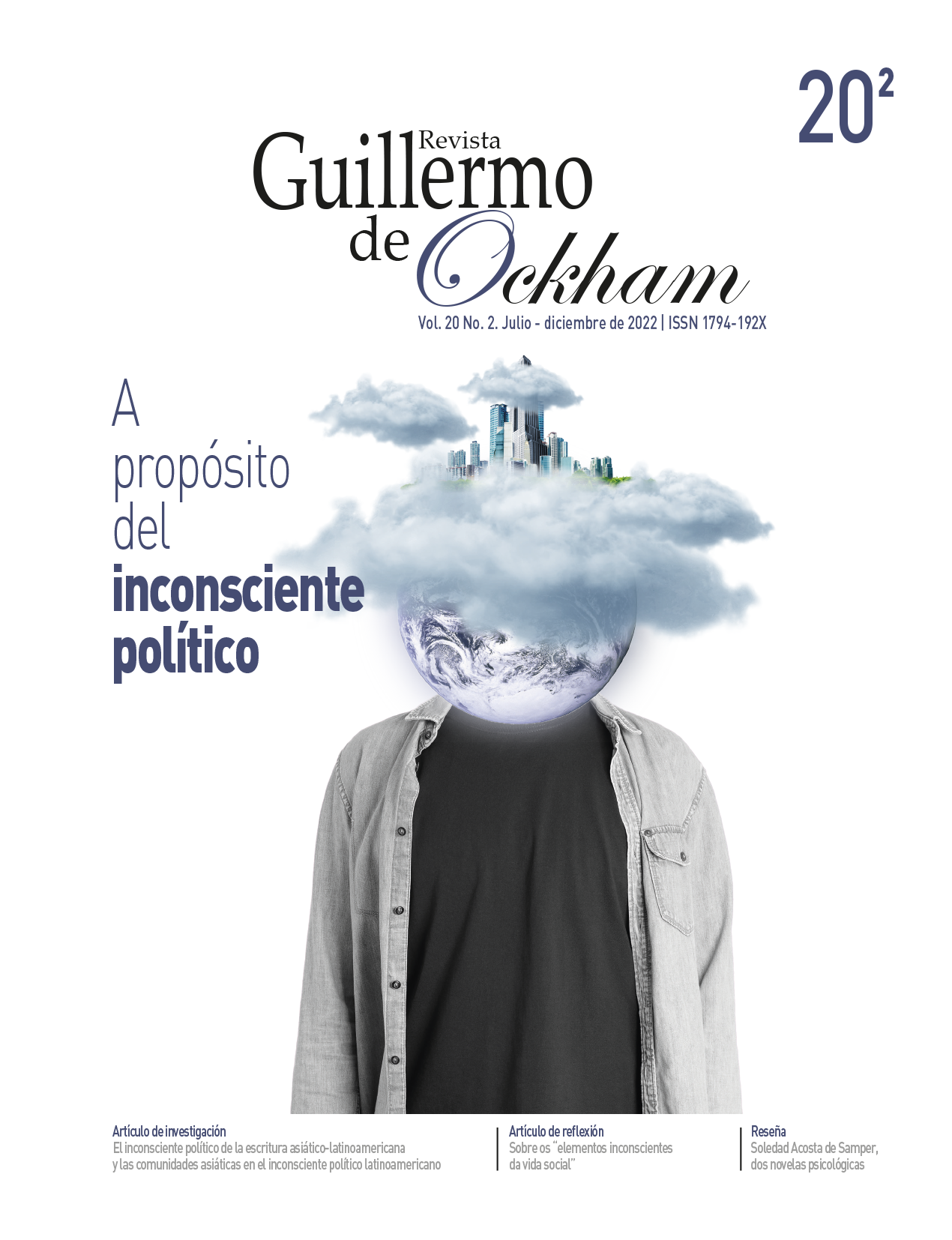The Revista Guillermo de Ockham provides an immediate and open access to its content, based on the principle of offering the public a free access to investigations to provide a global interchange of knowledge.
Unless otherwise established, the contents of this journal has a license with Creative Commons Attribution-NonCommercial-NoDerivatives 4.0 International (CC BY-NC-ND 4.0) http://creativecommons.org/licenses/by-nc-nd/4.0/
- Attribution: You must give appropriate credit, provide a link to the license, and indicate if changes were made. You may do so in any reasonable manner, but not in any way that suggests the licensor endorses you or your use.
- NonCommercial: You may not use the material for commercial purposes.
- NoDerivatives: If you remix, transform, or build upon the material, you may not distribute the modified material.
- No additional restrictions: You may not apply legal terms or technological measures that legally restrict others from doing anything the license permits.
Abstract
The question I have tried to answer is whether there is such a thing as linguistic alienation and what its consequences are for Marxist literary studies and for understanding the so-called "superstructure" in general. Relevant assumptions on this subject were elaborated, above all, in the sixties and seventies by Lefebvre, Rossi-Landi, Baudrillard and Latouche, through the tabulation of a parallelism between Marx's theory of value and Saussure's theory of sign. In my opinion, all these hypotheses failed to understand the specificity of the Marxist interpretation of money, which is a very different form of semiotics, because (as Finelli and Arthur, among others, have shown) it owes much to Hegelian logic.
Therefore, I try to demonstrate that, putting certain categories of semiotics and philosophy of language to interpret the critique of Marx's political economy, money is not a sign but a code: paraphrasing Lacan, it could be said that capital is configured like a language. It is not, however, a neutral language, but a linguistic praxis capable of hiding a material situation through abstractions. If this is correct, we do not need to ask how a matter (the structure) acts on a series of semantic and ideological chains (the superstructure), but to what extent capital itself, considered as a text, functions as a formal model (using Marx's words: a formelle bestimmung) for the organization of all matter in which its domain of abstraction extends. The "structural causality" on which Jameson relies in The Political Unconscious is thus the result of the dialectical link between mechanical and expressive causalities.
Keywords:
References
Althusser, L.; Balibar, É. (1970). Reading Capital. London: New Left Books.
Arthur, C. (2005). The Concept of Money. In: Radical Philosophy, 134. [quoted from this link: https://tinyurl.com/2pf7haae].
Austin, I. (1962). How to Do Things with Words. Oxford: Clarendon.
Backhaus, H. G. (2009). Dialettica della forma di valore. Rome: Editori Riuniti.
Baudrillard, J. (1976). L’Échange symbolique et la mort. Paris: Gallimard.
Benjamin, W. (2008). The Work of Art in the Age of Mechanical Reproduction. London: Penguin.
Calvino, I. (1987). The Uses of Literature. Essays. San Diego: Harcourt Brace.
D’Urso, A. (2015). Théories économiques et sémiotiques de la valeur. Une approche homologique et une proposition inédite. In: Synergies Italie, 11, pp. 37-49.
Eco, U. (1976). Theory of Semiotics. Bloomington: Indiana University Press.
Id. (1995). The Search for the Perfect Language. Hoboken: Wiley-Blackwell.
Finelli, R. (2005). La scienza del Capitale come “circolo del presupposto-posto”. Un confronto con il decostruzionismo. In: M. Musto (Ed.), Sulle tracce di un fantasma. L’opera di Karl Marx tra filologia e filosofia. Rome: manifestolibri. [quoted from the link: https://tinyurl.com/5a98mw42]
Id. (2014). Il parricidio compiuto. Il confronto finale di Marx con Hegel. Milano: Jaca Book.
Id. (2015). A Failed Parricide. Hegel and The Young Marx. Leiden: Brill.
Goldmann, L. (1975), Towards a Sociology of the Novel. New York: Tavistock Publications.
Grice, P. (1957). Meaning. In: The Philosophical Review, 66, pp. 377-88.
Jakobson, R. (1960). Closing Statements: Linguistics and Poetics. in T. A. Sebeok (Ed.), Style In Language (pp. 350-377). Cambridge Massachusetts: MIT Press.
Jameson, F. (2006). The Political Unconscious: Narrative as a Socially Simbolic Act. London: Routledge.
Kripke, S. (1999). Naming and Necessity. Cambridge: Harvard University Press.
Latouche, S. (1973). Linguistique et économie politique. L’homme et la société, 28, pp. 51-70.
Lefebvre, M. (1966). Le Langage et la Société, Paris: Gallimard.
MECW (1996). Marx Engels Collected Works, vol. 35. London: Lawrence & Wishart.
Redolfi Riva, T. (2009). Teoria del valore e ricostruzione dialettica. H.G. Backhaus e la critica dell’economia politica. In: H.G. Backhaus. Dialettica della forma di valore (pp. 9-51). Rome: Editori Riuniti.
Rossi-Landi, F. (1968). Il linguaggio come lavoro e come mercato. Milan: Bompiani.
Sraffa, P. (1960). Production of Commodities by Means of Commodities: Prelude to a Critique of Economic Theory. Cambridge: Cambridge University Press.
Žižek, S. (2012). Less Than Nothing: Hegel and the Shadow of Dialectical Materialism. London: Verso.

































